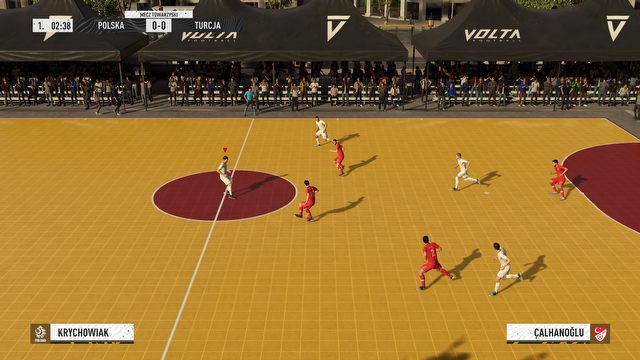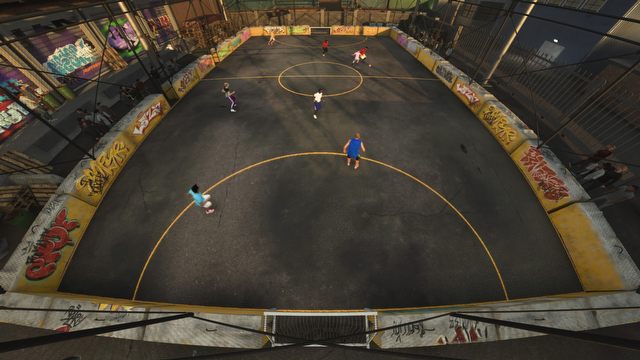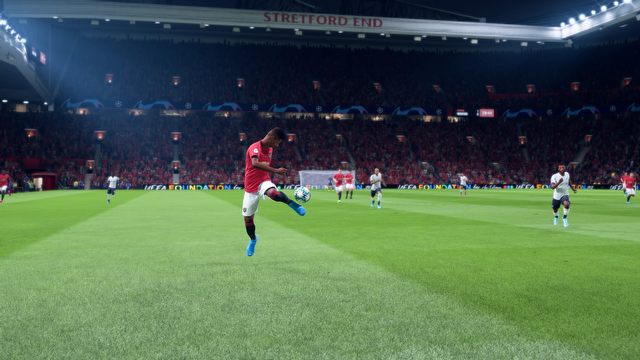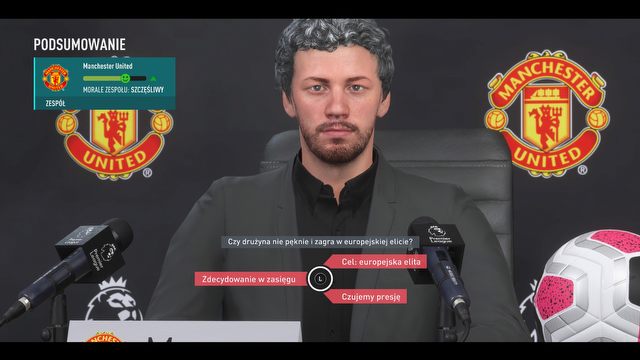FIFA 20 Review – the Return of the Party Football King (Final Score)
FIFA 20 once again proves that when it comes to playing with friends, nobody's got anything on this series. Unfortunately, things aren't so great with everything the game offers.
The review is based on the PS4 version. It's also relevant to XONE version(s).
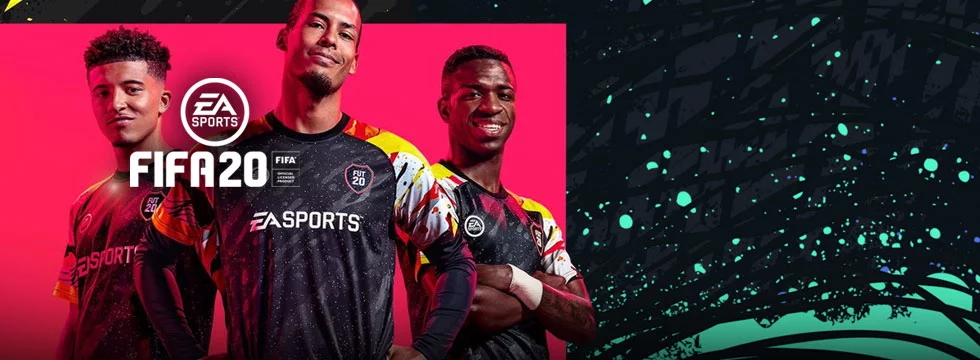
Before we get into this: if you were to evaluate FIFA 20 as a stand-alone game, the score could easily be one point higher. The Volta turns out a great addition; I can easily imagine it being just put in there without much consideration, but it can actually eclipse the standard game modes. The gameplay was slowed down a bit and no longer boils down to sprinting from goal to goal, not to such huge extent, and the neglected career was also brushed up a bit. This is a production that, once again, reminded me why I love FIFA so much as a game, and why I despise it as a series. The novelties are enjoyable, but the series is suffering from the same pitfalls it always has, and it's really annoying that with yet another installment, nothing has been done to address those glaring issues.
Volta is about the best thing you can do with friends on a couch
- Volta mode is a guarantee of great fun with friends;
- new options of House Rules are absurd – and absurdly satisfying;
- The Volta mode offers a slew of content – arena, personalization, some plot;
- 1v1 situations are very intuitive;
- the aspects of the strength and speed of the players were more realistically presented;
- post-game interviews, conferences and conversations with players are a nice addition to the career mode;
- the match atmosphere is still a masterpiece.
- the most pestering problems were still not fixed;
- Volta with the AI is no fun;
- the story campaign doesn't seem to offer anything interesting;
- new set-pieces mechanics are initially completely unintuitive;
- positional attack still doesn't exist;
- creating chances in a creative way is an abstract concept in this game;
- there are no licenses for two huge clubs.
The most important novelty in this installment is, of course, the Volta mode, which is the core element of FIFA's stronger focus on becoming the king of friendly, local game sessions. This mode allows you to play in several variants – 3v3, 4v4, or 5v5, with or without goalkeepers, indoors and outdoors, on courts across the world. It's a completely different experience than the regular games, but after the first game with friends, none of us were in a hurry to return to the traditional competition.
Volta offers not only spectacular skills (look FIFA Street), offering a powerful set of tools for making your opponents look amateur. Heel shots, chip shots, juggling the ball over the opponent – everything here is designed to maintain a healthy balance between finesse and showing off.
As a result, wining the games in Volta quickly stops being the priority, and the players begin to do dork around with the ball, waiting for the defenders to return just to dribble some more, nutmeg them off the wall... It's entertaining as hell, and ends up with sociable games full of banter, harmless jokes, and hockey scores.
Things are similar in the online modes – so far, most of the opponents I played against emphasized style rather than results. Another matter is that EA Sports have done pretty much nothing to make us care about the result of Volta games. Online games pretty much boil down to advancing in the leagues and playing stronger opponents – it's a great shame this mode wasn't included in Ultimate Team, or indeed that the experience is completely not diverse. At the moment, the only motivation to play Volta online is that it's simply good entertainment, but in time, the lack of any reward for the competition may kill it. But let's not get ahead of ourselves here – at this point, meeting a living enemy in the new mode is a guarantee of great fun.
Need two for Volta
But if you decide to play against the AI, you're in for a disenchantment. The AI is a bore, it apparently doesn't need reinforcing its virtual ego with spectacular skills, and completely lacks a sense of humor – hence, if you're trying to amuse it with your incredible skills, it will often result in the opponents taking the ball from you, and trying to score without making too much fuss about it. In other words: the AI in Volta could use some reorientating, so that it gets the difference between asphalt and grass. It soon turns out that if you don't want to be surprised with counterattacks, you should be rather conservative and cautious with the ball – which is the total opposite of what street football should be about.
Volta doesn't make too good an impression in story mode. We have a lot of personalization options for each of our team members, and for developing our own avatar; there are challenges, there are some things to unlock, but everything shatters when it hits the brick wall of the plot. Everything, however, crashes into the brick wall of the story. Rather than a quirky, slightly self-conscious, and amusing story about an amateur team climbing to fame, we've got a scenario that's trying way to hard to be serious. There's some incredibly important tournament going on, there are the mandatory antagonists – some absurdly self-confident jerks that lack any credibility, there are cheesy dialogs, and a protagonist, whose character arc goes from boring to annoying. On top of it all, the story is designed as a moralizing lesson about respect, professional attitude towards football, and struggling against anything life throws at you. This is another proof that EA Sports will sooner give up loot box... ekhm, I mean "surprise mechanics" in the Ultimate Team that write a plot that remotely makes sense.

When reviewing the last FIFA, I sung praises about how great are the custom games, which – just like Volta – were perfect for playing with friends. I am so very pleased to report that in this edition, the House Rules not only returns, but is also enhanced with two more modes. That one that's less bonkers – King of the Hill – is about holding possession of the ball on the given fragment of the pitch before scoring a goal. The real fun begins, however, in the Mystery Ball Mode, where the ball modifies the attributes of the players every few minutes. It can double the speed, increase shooting power, allow super precise crosses – or, increase the value of each scored goal from one to three points. If it seems silly, it's probably because it is... but it's fun at the same time.
The fact that Volta was only partially successful is all the more upsetting because the novelties in other modules are even less impressive. While I usually needed a considerable amount of time to adapt to new FIFAs, this time, I was instantly on the ball – which may be convenient, but it also goes to show how little has changed. The game seems to be a little slower, tackles and running look more realistic, the first touch is more intuitive, the goalkeepers are balanced better. The latter is especially visible in one-on-one situations – in these, the attackers are now much more likely to come out on top. This is a big improvement over the previous games in the series, where goalkeepers seemed to have superhuman reflexes in these situations.
Changes on the pitch?
These changes are all in plus, but they're not so extensive as to cover the game's greatest shortcomings, also present in all the latest installments. The midfield is usually completely redundant – FIFA 20, just like its predecessors, promotes, above all, long, through passes, fast wingmen swoops, and fierce exchanges of attacks.
In a game that seemingly strives to be a realistic football sim, the midfielders should be the core of the team, the tissue joining the defense and offensive together. Meanwhile, even starting with guys like Kevin De Bruyne, N’Golo Kante or Paul Pogba, the only thing the midfield does is passing balls to the wings. Concepts such as dominating the midfield, destruction, or postitional attack are apparently alient to EA Sports. Players controlled by the AI look for free space rather reluctantly, and instead seem to suggest: "Go on, pass the ball to the wing, cross into the box, score a goal, and let's get this over with."
The wings of teams controlled by the AI, on the other hand, are real freeways that fast wingers can use for sprinting to their hearts' content. The opponent's defenders can stop them more easily now since the game emphasizes physical strength a bit more, but still, it's the exact same scheme as we've seen in the game since like 2001. It's hard to take FIFA 20 seriously as a football simulator when its idea of creating a situation is either to throw the ball on the flank, or get a through ball to the striker.
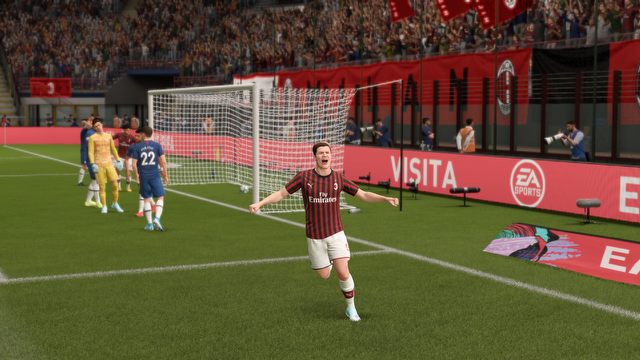
Apparently, one of the greatest revelations of Serie A during the last season didn't deserve his own face in the game.
The only serious change of the mechanics concerns set pieces – the free kicks and penalties. In FIFA 20, the cross hair is back – its size increases when you give the shot more power, and you can improve the accuracy by pressing the shot button when the free kick or penalty taker makes contact with the ball. In addition, in free kicks, we can give the ball the desired rotation. This system seems vague at first, and you probably will scold it as much as I did, but I have good news – after a while, it should click. Of course, I'd prefer more intuitive solutions that promote skill rather than just aiming, but on the other hand – the series always had a problem with set pieces, so it's good that the twenty at least attempted to address the issue.
HEY, WHAT HAPPENED TO JUVE?

I never thought I'd say this, but, for the first time in a long time, FIFA is disappointing when it comes to licenses. We still don't have some major national teams, such as Croatia, and in Brazil, we get a team of invented names. In addition, Electronic Arts lost the rights to the images of Juventus Turin, which in the game was substituted with Piedmont Calcio. The absence of the most titled Italian club is certainly a big issue.
In the limelight
Half-hearted attempts were also made in the mode, which I have particular affinity for. The career mode has seen some changes, but the most flagrant issues were neglected. Press conferences and post-match interviews, during which we can motivate and praise the team or specific players, are of course cool, just like the ability to communicate directly with the players or the extensive manager customization. But there's still no trace of a reasonable transferring policy of the AI-controlled clubs, robust loans of young players, nor an additional layer of club management. It's good some of the issues of the career were addressed – but unfortunately, not the most glaring ones.
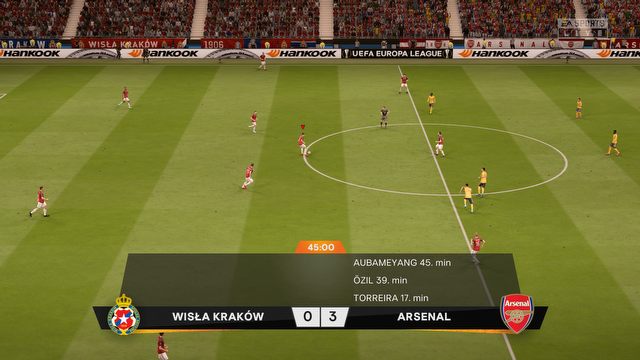
On one hand, FIFA 20 wants realism, on the other, it still allows teams from Polish Ekstraklasa to European cups.
The Ultimate Team also didn't see any major overhauls. The modes known from the last game (Division Rivals, Squad Creation Challenges, Team of the Week, Squad Battle, and Seasons Draft) are still here, but we also got challenges seemingly inspired by Fortnite. Completing them – and there's quite a few – yields experience points, letting us advance to higher levels, where we get some rewards: loan cards, special items, or packs of players. This is merely a starter that's unlikely to be the mainstay for anyone, but we have to mention it since we're talking about the FUT – any other changes are limited to the functioning of the interface and the purely cosmetic issues.
Those who despise FIFA – which is quite a lot of people – might have prophetized in 2017 that "the twenty" will be a reheated meal. And it would be hard to deny they would have been at least partially right, but on the other hand, it's hard to expect a revolution every 12 months in a game based on a rather straightforward discipline. The new FIFA's problem isn't lack of novelty – it is there, and it was done properly.
Volta was indeed so much fun that if I'd written the entire review after one of the longer sessions in the mode, I'd probably give it a 10. The trouble is that the devs are racing to build new floors for a house, the foundations of which require major reconstruction. The greatest pitfalls that have been pestering the series for years – schematic gameplay, the AI that's really torpid both in defense and offense, the mechanical intricacies that discourage creativity – all these are all too familiar for anyone who's played the series for a while. And as long as the above statement remains true, the series from EA Sports will be a simulator only in theory.
ABOUT THE AUTHOR
I spent about 30 hours with FIFA 20, mainly focusing on thoroughly testing the Volta – both in the story mode (which required enormous perseverance from me), and playing against live opponents, both online, and on couch. My introduction to the series was the legendary FIFA 98. The 2000 edition was the first game I got for my computer, and if I counted up how much time I spent with all the subsequent installments, I'd have some sad gentlemen from the addiction treatment center show up at my front door by tomorrow morning.
DISCLAIMER
We've received a review copy of the game from Electronic Arts – much appreciated!
FIFA 20
FIFA 20 Review – the Return of the Party Football King (Final Score)
FIFA 20 once again proves that when it comes to playing with friends, nobody's got anything on this series. Unfortunately, things aren't so great with everything the game offers.

